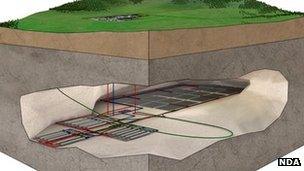Allerdale and Copeland councils nuclear waste response
- Published

Radioactive waste can be stored in underground vaults at a depth of between 200m (656ft) and 1,000m (3,280ft)
Two district councils in Cumbria have said they will be considering their responses to the revised nuclear waste repository search process.
The government has announced that district authorities will lead the decision on where to store high level radioactive waste.
Copeland and Allerdale councils were previously willing to be considered.
However, in January they were over-ruled by the county council, stopping the search for a site going further.
The Department for Energy and Climate Change has outlined a new process, which allows communities represented by a district council to participate on their own.
It said in a statement: "This would have a profound and long-term positive economic impact on the area selected for the site, stimulating local businesses, supply-chains, and providing skilled jobs and training opportunities.
"Government will provide a generous community benefits package, potentially through a community fund, to ensure that the strategic national importance of the project is properly reflected at local level."
Councillor Elaine Woodburn, leader of Copeland Borough Council, said: "As over 70% of the country's higher activity radioactive waste is already located in Copeland, it is clear that the proposals will have an impact on the borough and our residents.
"We will therefore be taking our time to fully understand and consider the process that the government has outlined, before we respond to the consultation."
Lack of 'plan B'
Alan Smith, leader of Allerdale Borough Council, said: "The future of radioactive waste storage and disposal is of great interest to the people of Allerdale.
"We will be taking the time to study the Government's proposals carefully before we respond to the national consultation."
Councillor Stewart Young, leader of Cumbria County Council, said: "The county council expressed its concerns about the previous process when Cabinet decided in January 2013 not to proceed to the next stage.
"Those concerns included uncertainty on the right for communities to bring the process to a halt if they are not happy, a complete lack of detail about the timing and quantum of any community benefits package, and the lack of a 'Plan B' for more robust interim surface storage plans for the high-level radioactive waste currently kept at Sellafield if a site cannot be found.
"We will be looking closely at these revised proposals to see whether our concerns have been addressed."
It could take up to 15 years for the site-selection process, with construction taking a further 15.
- Published13 February 2013
- Published30 January 2013
- Published29 January 2013